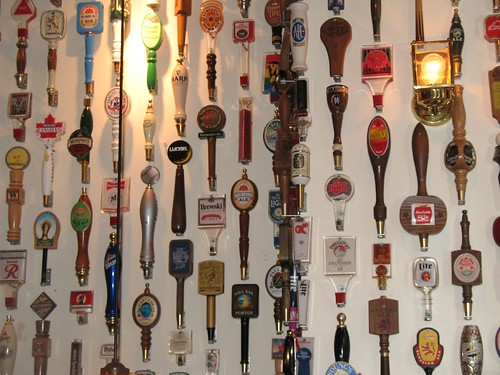Tricking students into learning with fun has always been a ploy of educators. When I was a kid, my kindergarten teacher, tricked my class into enjoying reading by serving eggs and ham that were dyed green. In sixth grade, while studying Ancient Egypt, we made papier-mache sarcophagi. To this day, I still remember well Dr. Seuss’s Green Eggs and Ham (I will not eat them, Sam I am), and I know what the heck a cartouche is.
Nowadays, students are embracing this same concept, incorporating their interests into their fields of study and making learning fun. They’re studying what they feel passionately about.
And what has always interested college students?--Beer. Duh.
At Rice University in Houston, Texas, a group of students called the Rice BiOWLogists, are using genetic engineering to create beer that contains resveratrol, a chemical in wine that's been shown to reduce cancer and heart disease in lab animals.
Resveratrol is a naturally occurring compound that some studies have found to have anti-inflammatory, anticancer and cardiovascular benefits for mice and other animals. It’s still unclear whether humans enjoy the same health benefits, but resveratrol is already sold as a health supplement.

"The great thing about synthetic biology research is that it stimulates undergraduate creativity and gives them an opportunity to work collaboratively at an early stage of their science and engineering education," said Jonathan Silberg, assistant professor of biochemistry and cell biology. "While students work collaboratively in other undergraduate research endeavors, they typically are not given the pie-in-the-sky opportunity to pursue their own ideas."
In November, the "BioBeer" will be entered in the International Genetically Engineered Machine (iGEM) Competition in Cambridge, Mass. It's the world's largest synthetic biology competition, where teams use a standard toolkit of DNA building blocks--like genetic LEGO blocks, to create living organisms. Past iGEM creations have included sheets of bacteria that behave like photographic film and bacteria that smell like mint while they're growing but like bananas when they stop growing.
This will be Rice BiOWLogists third year at the iGEM competition. Last year, their bacterial virus that fought antibiotic resistance, though well-received, finished out of the prize running.
"After last year's contest, we were sitting around talking about what we'd do this year," said junior Taylor Stevenson. "Peter Nguyen made a joke about putting resveratrol into beer, but none of us took it seriously." That is, until they discovered literature concerning modifying yeast with resveratrol-related genes, as well as teams who had made previous attempts.
"That was when we said, 'You know, we could actually do this,'" said junior Thomas Segall-Shapiro.
With less than a month until the competition, the team has yet to brew a drop. Their work has mostly focused on creating a genetically modified strain of yeast that will ferment beer and produce resveratrol at the same time. Although the team plans to brew a few test batches in the coming weeks, the batches will be undrinkable because they will contain unappetizing chemical "markers" that are necessary to the experiments. Until those chemical markers are removed, not a drop will pass anyone’s lips.
"It will be a long time before anybody consumes any of this,” said Segall-Shapiro.
The team is working with a strain of yeast used to make wheat beer, a sample they got from Houston's Saint Arnold Brewing Company—they are modifying it with two sets of genes. The first set allows the yeast to metabolize sugars and excrete an intermediate chemical that the second set can later convert into resveratrol.
"One set of genes gets you from A to B, and the other gets you from B to C," said Stevenson. "We've already created a strain that has the B-to-C genes, but our genes for the A-to-B part are still on order." The team hopes to complete the full A-to-C yeast in time to get some data before the November competition.
Team members of BiOWLogists recently filed paperwork to create the Rice Synthetic Biology Club; official recognition will help ensure the school’s annual presence at iGEM, long after current team members graduate.
Additional 2008 Rice BiOWLogists include Selim Sheikh, Arielle Layman, Sarah Duke, Justin Judd and faculty advisers Silberg, George Bennett and Beth Beason (Biochemistry and Cell Biology); Oleg Igoshin and Junghae Suh (Bioengineering) and Ken Cox (Chemical and Biomolecular Engineering).





Comments